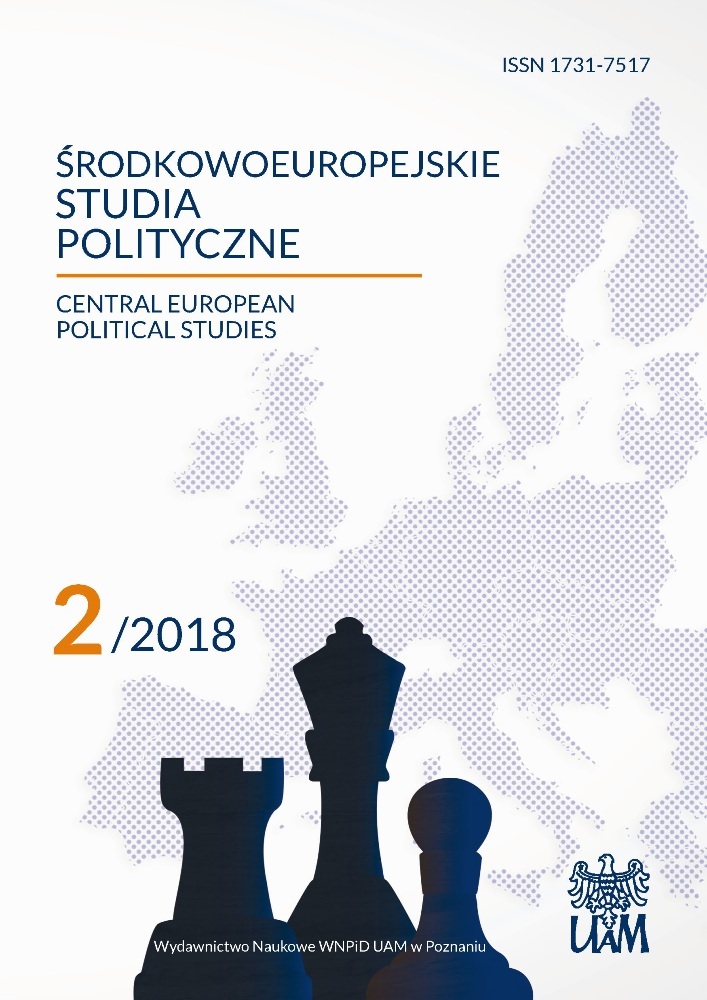Abstrakt
The paper attempts to analyze the results of the European Social Survey Round 6 (2012, 2013), focusing on the section related to how democracy is understood in Poland and in the Czech Republic. The most interesting issue encompassed the differences in how democracy is defined in the two countries and the outcomes these differences produce in terms of the perceived legitimacy of the system, as well as demographic factors that correlate with differences in the understanding of democracy in both surveyed groups. Statistical analyses carried out in the paper indicated the presence of different definitions of democracy formulated in Poland and in the Czech Republic (the Czechs gave stronger emphasis to the liberal aspect of democracy, whereas Poles stressed its social aspects more). Nevertheless, the relationship between the definition of democracy and the perceived level of legitimacy of the democratic system (for dispersed and specific legitimacy alike) were found to be relatively weak, as was the case of the relationship between the understanding of democracy, system legitimacy and socio-demographic factors. The only factor found to be significant for the perceived level of legitimacy of the democratic system concerned the level of satisfaction with one’s own material situation.
Bibliografia
Andersen R. (2012), Support for democracy in cross-national perspective: The detrimental effect of economic inequality, “Research in Social Stratification and Mobility,” 30(4), pp. 389–402, https://doi.org/10.1016/j.rssm.2012.04.002.
Anýžová P. (2018), Čeho si Češi váží a jaké hodnoty dnes preferují?, in: Jak se žije Čechům v současné Evropě?, eds. J. Pospíšilová, E. Krulichová, Academia, Sociologický ústav AV ČR, Praha, pp. 13–36.
Baviskar S., Malone M. F. T. (2004), What Democracy Means to Citizens – and Why It Matters, “European Review of Latin American and Caribbean Studies,” 76, pp. 3–23.
Brokl L., Seidlová A., Bečvář J., Rakušanová P. (1999), Postoje československých občanů k demokracii v roce 1968 (no. 99:8), Praha.
Boski P. (2009), Kulturowe ramy zachowań społecznych. Podręcznik psychologii międzykulturowej, chapter 10, Wydaw. Naukowe PWN, Academia. Wydaw. SWPS, Warszawa.
Boski P., Baran M. (2018), Polska na kulturowej mapie Europy – Orientacja humanistyczna w kulturze polskiej, in: Podzielony umysł społeczny. Polacy po ćwierćwieczu demokracji, ed. M.
Drogosz, Wydaw. Stowarzyszenia Filomatów, Warszawa.
CBOS (2017), Polacy o demokracji, Komunikat z badań CBOS (14/2017), Warszawa.
CBOS (2017), Opinie o demokracji, Komunikat z badań CBOS (118/2017), Warszawa.
CBOS (2017), Zasady demokracji i ich realizacja w Polsce, Komunikat z badań CBOS (107/2017), Warszawa.
CBOS (2018), Opinie o demokracji, Komunikat z badań (75/2018), Warszawa.
CVVM (2018), Názory české společnosti na úroveň demokracie a respektování lidských práv v ČR – únor 2018, Tisková zpráva CVVM, Sociologický ústav AV ČR, v.v.i., Praha.
Dahl R. A. (2001), O demokracii: průvodce pro občany (1st ed.), Portál, sro, Praha.
Easton D. (1975), A Re-assessment of the Concept of Political Support, “British Journal of Political Science,” 5(4), pp. 435–457, https://doi.org/10.1017/S0007123400008309.
ESS Round 6: European Social Survey Round 6 Data (2012), Data file edition 2.3. NSD – Norwegian Centre for Research Data, Norway – Data Archive and distributor of ESS data for ESS ERIC.
Inglehart R., Catterberg G. (2002), Trends in Political Action: The Developmental Trend and the Post-Honeymoon Decline, “International Journal of Comparative Sociology,” 43(3–5), pp. 300–316, https://doi.org/10.1177/002071520204300305.
Inglehart R. (2000), Kultura a demokracja, in: Kultura ma znaczenie, eds. L. E. Harrison, S. P. Huntington, Zysk i S-ka, Poznań.
Karp J. A., Banducci S. A., Bowler S. (2003), To Know it is to Love it?: Satisfaction with Democracy in the European Union, “Comparative Political Studies,” 36(3), pp. 271–292, https://doi.org/10.1177/0010414002250669.
Kornberg A., Clarke H. D. (1994), Beliefs About Democracy and Satisfaction with Democratic Government: The Canadian Case, “Political Research Quarterly,” 47(3), pp. 537–563, https://doi.org/10.1177/106591299404700301.
Kunštát D. a kol. (2014), 25 let české demokracie očima veřejnosti (1st ed.), Academia, Sociologický ústav AV ČR, v.v.i., Praha.
Leff C. S. (2012), Tworzenie wartości demokratycznych w Republice Czeskiej po 1989 r., in: S. P. Ramet, Polityka Europy Środkowej i Południowo-Wschodniej po 1989 r., Książka i Wiedza, Warszawa.
Linek L. (2016), Legitimacy, Political Disaffection and Discontent with (Democratic) Politics in the Czech Republic, “Acta Politologica,” 8(2), pp. 51–73.
Lyons P. (2013), Adjectives of Democracy: Citizenship and Political Attitudes Under Socialist and Liberal Democracy in the Czech Republic, Sociologické nakladatelství (SLON), Praha.
Magalhaes P. C. (2014), Government effectiveness and support for democracy, “European Journal of Political Research,” 53, pp. 77–97, doi: 10.1111/1475-6765.12024.
Mansfeldová Z. (2006), The Czech Republic: Critical democrats and the persistence of democratic values, in: Democracy and Political Culture in Eastern Europe, eds. H.-D. Klingemann, D. Fuchs, J. Zielonka, Routledge, Milton Park–Abingdon, pp. 102–118.
Miller, A. H., Hesli, V. L., & Reisinger, W. M. (1997). Conceptions of Democracy Among Mass and Elite in Post-Soviet Societies. British Journal of Political Science, 27(2), 157–190. https://doi.org/10.1017/S0007123497000100.
Mishler W., Rose R. (1999), Five Years After the Fall: Trajectories of Support for Democracy in Post-Communist Europe, in: Critical Citizens. Global Support for Democratic Government, ed. P. Norris, Oxford University Press, Oxford, pp. 78–99.
Mlejnek J. (2015), Kuře v hrnci a křeček v kole: česká politika a její transformace v kontextu civilizační krize, CDK, Brno.
Neundorf A. (2010), Democracy in Transition: A Micro perspective on System Change in Post-Socialist Societies, “The Journal of Politics,” 72(4), pp. 1096–1108, https://doi.org/10.1017/S0022381610000551.
Pająk B. (2008), Demokracja polska i niemiecka. Tradycja, teraźniejszość, przyszłość, Wydawnictwo INPiD UAM, Poznań.
Pospíšilová J. (2018), Rozumějí Češi demokracii?, in: Jak se žije Čechům v současné Evropě?, eds. J. Pospíšilová, E. Krulichová, Academia, Sociologický ústav AV ČR, Praha, pp. 107–126.
Reykowski J. (1995), Potoczne wyobrażenia o demokracji. Psychologiczne uwarunkowania i konsekwencje, Wydaw. IPPAN, Warszawa.
Svolik M. W. (2013), Learning to love democracy: Electoral accountability and the success of democracy, “American Journal of Political Science,” 57(3), pp. 685–702, https://doi.org/10.1111/ajps.12005.
Thomassen J. (1998), Support for Democratic Values, in: Citizens and the State, eds. H.-D. Klingemann, D. Fuchs, Oxford University Press, Oxford, pp. 383–416.


